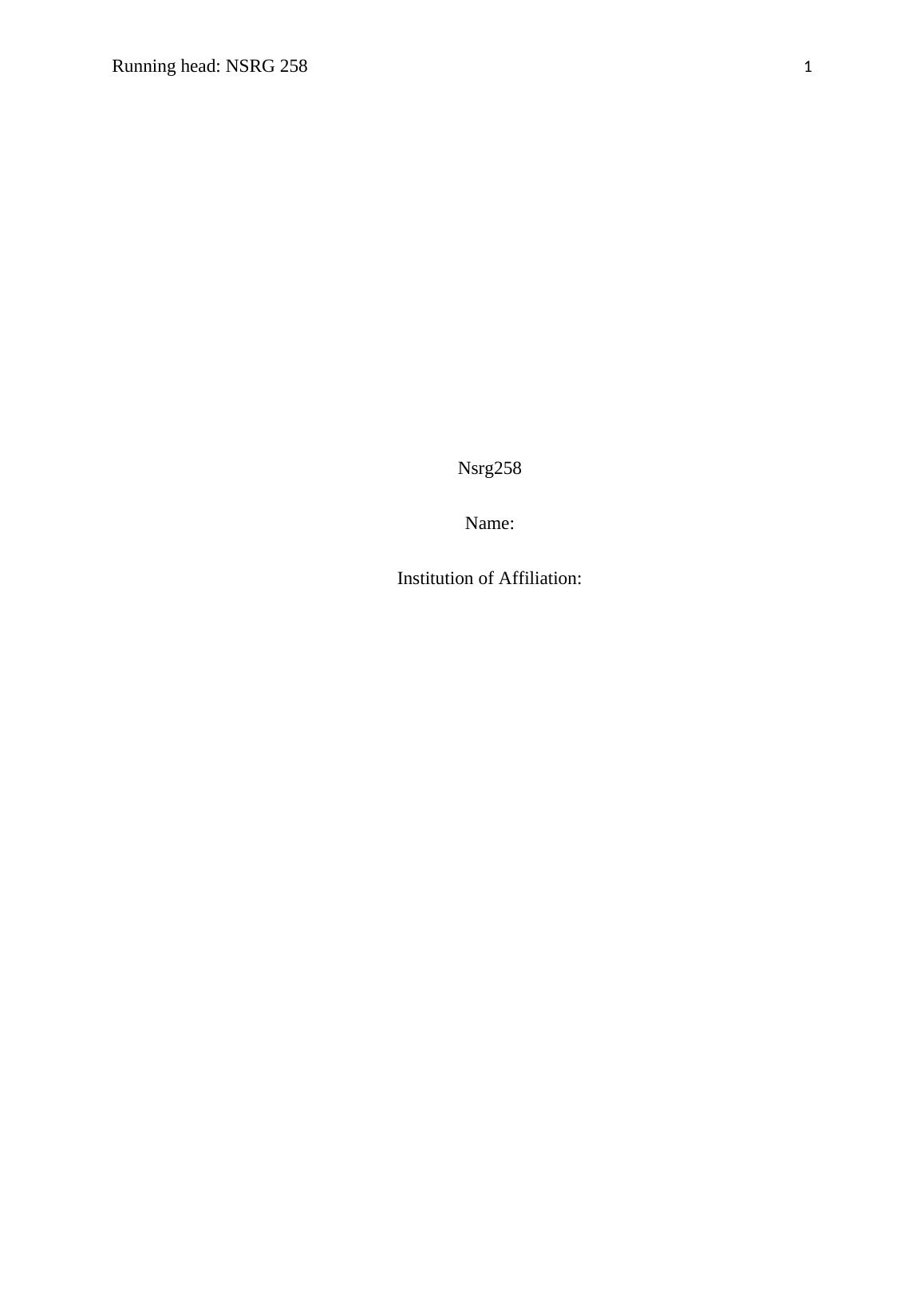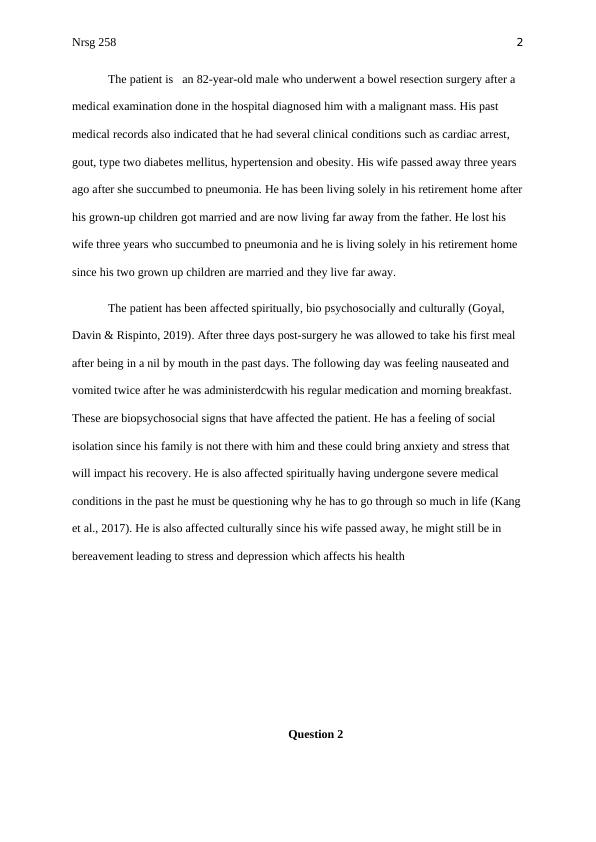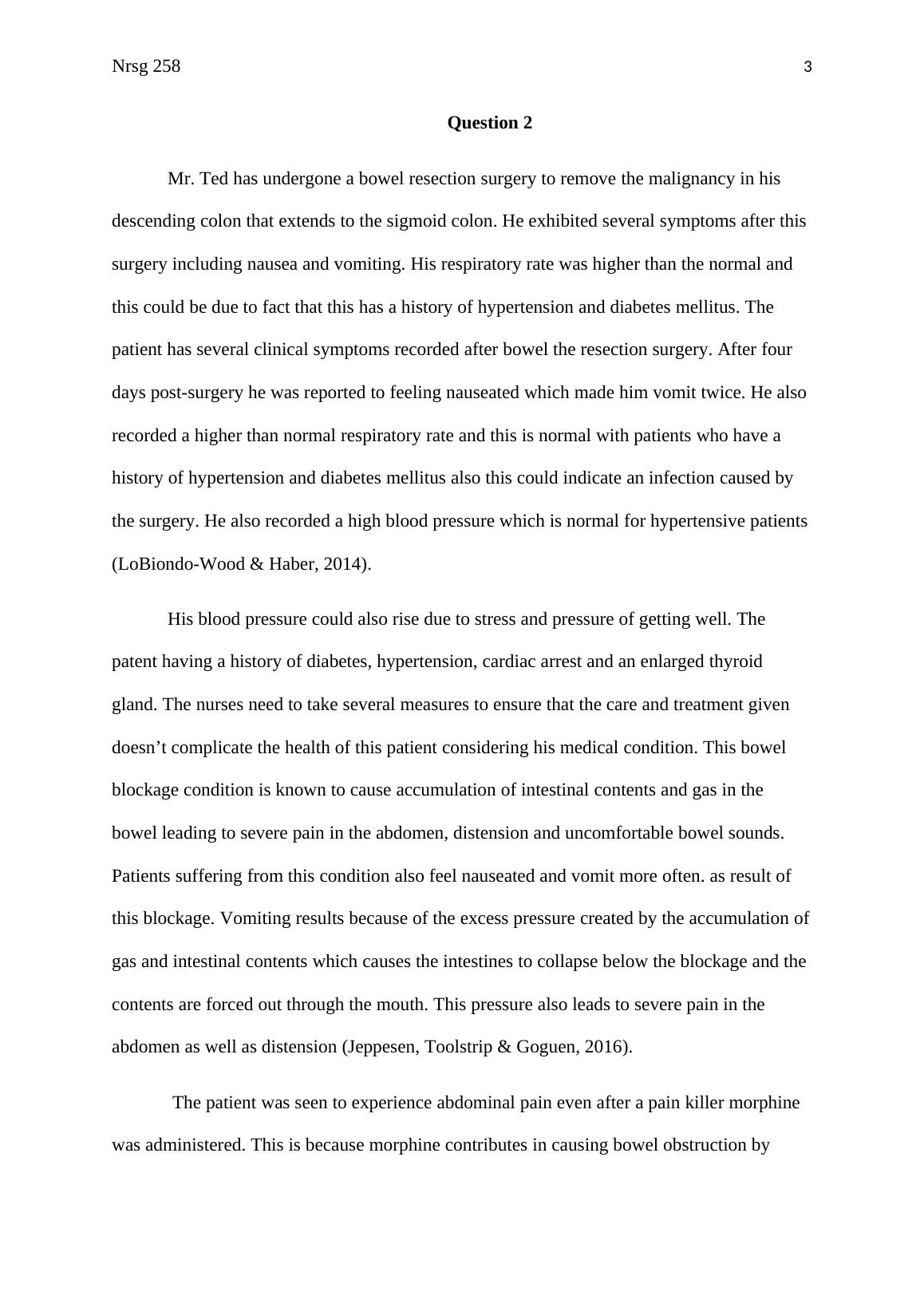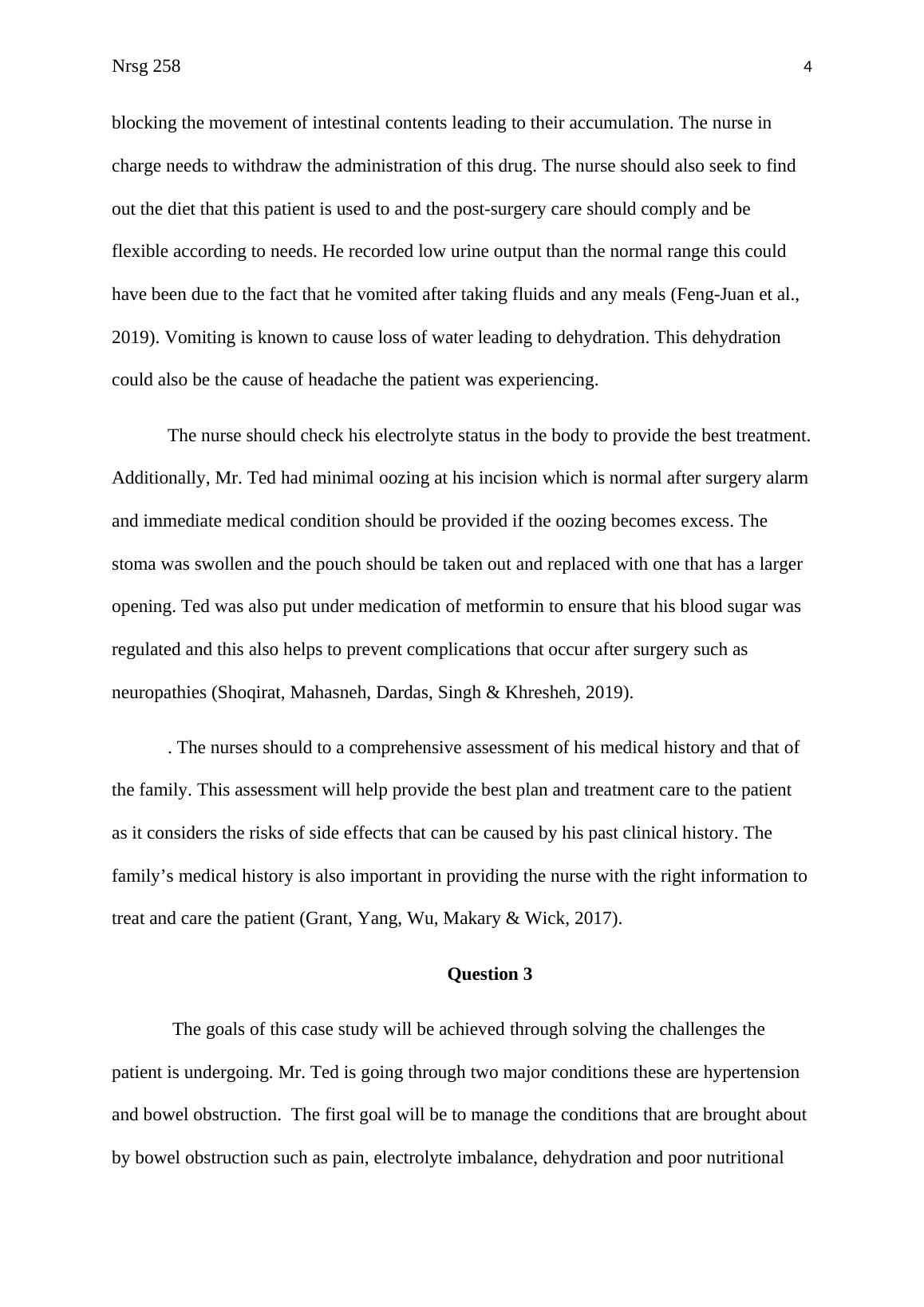Perioperative Nursing Care Experience
Added on 2022-09-12
12 Pages2972 Words12 Views
Running head: NSRG 258 1
Nsrg258
Name:
Institution of Affiliation:
Question 1
Nsrg258
Name:
Institution of Affiliation:
Question 1

Nrsg 258 2
The patient is an 82-year-old male who underwent a bowel resection surgery after a
medical examination done in the hospital diagnosed him with a malignant mass. His past
medical records also indicated that he had several clinical conditions such as cardiac arrest,
gout, type two diabetes mellitus, hypertension and obesity. His wife passed away three years
ago after she succumbed to pneumonia. He has been living solely in his retirement home after
his grown-up children got married and are now living far away from the father. He lost his
wife three years who succumbed to pneumonia and he is living solely in his retirement home
since his two grown up children are married and they live far away.
The patient has been affected spiritually, bio psychosocially and culturally (Goyal,
Davin & Rispinto, 2019). After three days post-surgery he was allowed to take his first meal
after being in a nil by mouth in the past days. The following day was feeling nauseated and
vomited twice after he was administerdcwith his regular medication and morning breakfast.
These are biopsychosocial signs that have affected the patient. He has a feeling of social
isolation since his family is not there with him and these could bring anxiety and stress that
will impact his recovery. He is also affected spiritually having undergone severe medical
conditions in the past he must be questioning why he has to go through so much in life (Kang
et al., 2017). He is also affected culturally since his wife passed away, he might still be in
bereavement leading to stress and depression which affects his health
Question 2
The patient is an 82-year-old male who underwent a bowel resection surgery after a
medical examination done in the hospital diagnosed him with a malignant mass. His past
medical records also indicated that he had several clinical conditions such as cardiac arrest,
gout, type two diabetes mellitus, hypertension and obesity. His wife passed away three years
ago after she succumbed to pneumonia. He has been living solely in his retirement home after
his grown-up children got married and are now living far away from the father. He lost his
wife three years who succumbed to pneumonia and he is living solely in his retirement home
since his two grown up children are married and they live far away.
The patient has been affected spiritually, bio psychosocially and culturally (Goyal,
Davin & Rispinto, 2019). After three days post-surgery he was allowed to take his first meal
after being in a nil by mouth in the past days. The following day was feeling nauseated and
vomited twice after he was administerdcwith his regular medication and morning breakfast.
These are biopsychosocial signs that have affected the patient. He has a feeling of social
isolation since his family is not there with him and these could bring anxiety and stress that
will impact his recovery. He is also affected spiritually having undergone severe medical
conditions in the past he must be questioning why he has to go through so much in life (Kang
et al., 2017). He is also affected culturally since his wife passed away, he might still be in
bereavement leading to stress and depression which affects his health
Question 2

Nrsg 258 3
Mr. Ted has undergone a bowel resection surgery to remove the malignancy in his
descending colon that extends to the sigmoid colon. He exhibited several symptoms after this
surgery including nausea and vomiting. His respiratory rate was higher than the normal and
this could be due to fact that this has a history of hypertension and diabetes mellitus. The
patient has several clinical symptoms recorded after bowel the resection surgery. After four
days post-surgery he was reported to feeling nauseated which made him vomit twice. He also
recorded a higher than normal respiratory rate and this is normal with patients who have a
history of hypertension and diabetes mellitus also this could indicate an infection caused by
the surgery. He also recorded a high blood pressure which is normal for hypertensive patients
(LoBiondo-Wood & Haber, 2014).
His blood pressure could also rise due to stress and pressure of getting well. The
patent having a history of diabetes, hypertension, cardiac arrest and an enlarged thyroid
gland. The nurses need to take several measures to ensure that the care and treatment given
doesn’t complicate the health of this patient considering his medical condition. This bowel
blockage condition is known to cause accumulation of intestinal contents and gas in the
bowel leading to severe pain in the abdomen, distension and uncomfortable bowel sounds.
Patients suffering from this condition also feel nauseated and vomit more often. as result of
this blockage. Vomiting results because of the excess pressure created by the accumulation of
gas and intestinal contents which causes the intestines to collapse below the blockage and the
contents are forced out through the mouth. This pressure also leads to severe pain in the
abdomen as well as distension (Jeppesen, Toolstrip & Goguen, 2016).
The patient was seen to experience abdominal pain even after a pain killer morphine
was administered. This is because morphine contributes in causing bowel obstruction by
blocking the movement of intestinal contents leading to their accumulation. The nurse in
charge needs to withdraw the administration of this drug. The nurse should also seek to find
Mr. Ted has undergone a bowel resection surgery to remove the malignancy in his
descending colon that extends to the sigmoid colon. He exhibited several symptoms after this
surgery including nausea and vomiting. His respiratory rate was higher than the normal and
this could be due to fact that this has a history of hypertension and diabetes mellitus. The
patient has several clinical symptoms recorded after bowel the resection surgery. After four
days post-surgery he was reported to feeling nauseated which made him vomit twice. He also
recorded a higher than normal respiratory rate and this is normal with patients who have a
history of hypertension and diabetes mellitus also this could indicate an infection caused by
the surgery. He also recorded a high blood pressure which is normal for hypertensive patients
(LoBiondo-Wood & Haber, 2014).
His blood pressure could also rise due to stress and pressure of getting well. The
patent having a history of diabetes, hypertension, cardiac arrest and an enlarged thyroid
gland. The nurses need to take several measures to ensure that the care and treatment given
doesn’t complicate the health of this patient considering his medical condition. This bowel
blockage condition is known to cause accumulation of intestinal contents and gas in the
bowel leading to severe pain in the abdomen, distension and uncomfortable bowel sounds.
Patients suffering from this condition also feel nauseated and vomit more often. as result of
this blockage. Vomiting results because of the excess pressure created by the accumulation of
gas and intestinal contents which causes the intestines to collapse below the blockage and the
contents are forced out through the mouth. This pressure also leads to severe pain in the
abdomen as well as distension (Jeppesen, Toolstrip & Goguen, 2016).
The patient was seen to experience abdominal pain even after a pain killer morphine
was administered. This is because morphine contributes in causing bowel obstruction by
blocking the movement of intestinal contents leading to their accumulation. The nurse in
charge needs to withdraw the administration of this drug. The nurse should also seek to find

Nrsg 258 4
out the diet that this patient is used to and the post-surgery care should comply and be
flexible according to needs. He recorded low urine output than the normal range this could
have been due to the fact that he vomited after taking fluids and any meals (Feng-Juan et al.,
2019). Vomiting is known to cause loss of water leading to dehydration. This dehydration
could also be the cause of headache the patient was experiencing.
The nurse should check his electrolyte status in the body to provide the best treatment.
Additionally, Mr. Ted had minimal oozing at his incision which is normal after surgery alarm
and immediate medical condition should be provided if the oozing becomes excess. The
stoma was swollen and the pouch should be taken out and replaced with one that has a larger
opening. Ted was also put under medication of metformin to ensure that his blood sugar was
regulated and this also helps to prevent complications that occur after surgery such as
neuropathies (Shoqirat, Mahasneh, Dardas, Singh & Khresheh, 2019).
. The nurses should to a comprehensive assessment of his medical history and that of
the family. This assessment will help provide the best plan and treatment care to the patient
as it considers the risks of side effects that can be caused by his past clinical history. The
family’s medical history is also important in providing the nurse with the right information to
treat and care the patient (Grant, Yang, Wu, Makary & Wick, 2017).
Question 3
The goals of this case study will be achieved through solving the challenges the
patient is undergoing. Mr. Ted is going through two major conditions these are hypertension
and bowel obstruction. The first goal will be to manage the conditions that are brought about
by bowel obstruction such as pain, electrolyte imbalance, dehydration and poor nutritional
status of the patient. The second goal is to manage the patients high blood pressure as this
may lead to other life-threatening complications such as cardiac arrest. The first intervention
out the diet that this patient is used to and the post-surgery care should comply and be
flexible according to needs. He recorded low urine output than the normal range this could
have been due to the fact that he vomited after taking fluids and any meals (Feng-Juan et al.,
2019). Vomiting is known to cause loss of water leading to dehydration. This dehydration
could also be the cause of headache the patient was experiencing.
The nurse should check his electrolyte status in the body to provide the best treatment.
Additionally, Mr. Ted had minimal oozing at his incision which is normal after surgery alarm
and immediate medical condition should be provided if the oozing becomes excess. The
stoma was swollen and the pouch should be taken out and replaced with one that has a larger
opening. Ted was also put under medication of metformin to ensure that his blood sugar was
regulated and this also helps to prevent complications that occur after surgery such as
neuropathies (Shoqirat, Mahasneh, Dardas, Singh & Khresheh, 2019).
. The nurses should to a comprehensive assessment of his medical history and that of
the family. This assessment will help provide the best plan and treatment care to the patient
as it considers the risks of side effects that can be caused by his past clinical history. The
family’s medical history is also important in providing the nurse with the right information to
treat and care the patient (Grant, Yang, Wu, Makary & Wick, 2017).
Question 3
The goals of this case study will be achieved through solving the challenges the
patient is undergoing. Mr. Ted is going through two major conditions these are hypertension
and bowel obstruction. The first goal will be to manage the conditions that are brought about
by bowel obstruction such as pain, electrolyte imbalance, dehydration and poor nutritional
status of the patient. The second goal is to manage the patients high blood pressure as this
may lead to other life-threatening complications such as cardiac arrest. The first intervention

End of preview
Want to access all the pages? Upload your documents or become a member.
Related Documents
Chronic illnesses such as hypertensionlg...
|11
|2915
|30
Nsrg258: Principles of Nursing Surgical | Q&Alg...
|11
|3524
|36
Principles Of Nursing And Ethicslg...
|11
|2943
|25
Case Study - Question Answerlg...
|10
|2808
|14
Nursing | Case Studies | Assignmentlg...
|9
|2520
|38
Case Study Edward (Ted) Williams is an 82year Old 2022lg...
|10
|2807
|21
